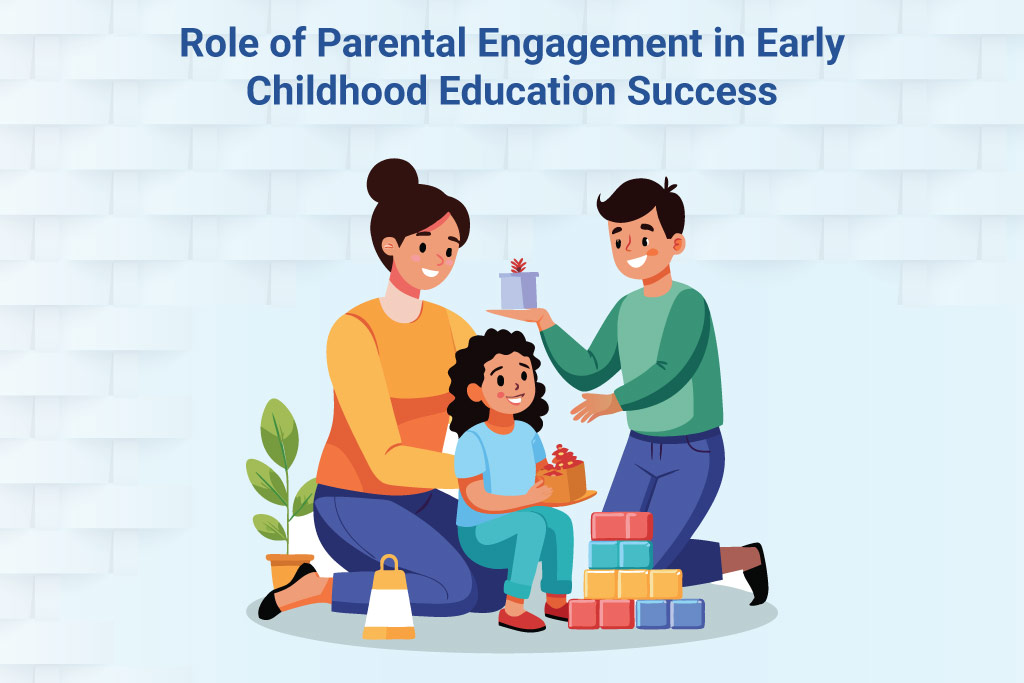Role of Parental Engagement in Early Childhood Education Success
Parental engagement is a very important aspect of a child’s overall development, especially in early childhood education. It means parents’ involvement in their child’s learning journey. If parents choose to play an active role in their child’s education, it helps to provide a positive learning atmosphere and benefits cognitive skills and emotional well-being.
Early childhood is a point in a child’s life where development is laid out and learnings prepared for the future. At this time, children acquire vital abilities through language as well as problem-solving and social interplay.
Parents are a child’s first teachers and their involvement in education at a young age has long-term benefits. This blog will explore the importance of parents’ role in their child’s education, the effective ways to be involved, the benefits, and common mistakes to avoid so that children get the best start in life.
Get involved and support your child’s learning journey today!
A] What is Parental Engagement?
Parental engagement is the partnership between parents and educators to promote children’s learning at home and at school. Activities include helping with homework, going to school meetings, and encouraging a stimulating home learning environment. Parental involvement aims to keep parents involved with school events whereas parental engagement stresses what can be referred to as actively shaping a child’s educational experience.
This requires careful effort and action to provide the academic and emotional support that children need to thrive. Parental engagement also includes setting academic expectations, fostering self-discipline, and reinforcing positive learning habits like fun phonics activities that extend beyond school hours.
B] Why is Parental Engagement Needed in a Child’s Education?
Parental engagement is vital for several reasons, directly impacting a child’s academic and personal growth. Here are some key reasons why it is needed:
1. Enhances Academic Performance
Research shows that children whose parents are actively engaged in their education tend to perform better in school. They develop strong literacy and numeracy skills and show increased enthusiasm for learning. Children benefit from an enriched vocabulary and improved comprehension when parents participate in learning activities at home.
2. Builds Confidence and Social Skills
When parents show interest in their child’s learning, it boosts self-esteem and encourages better communication and social interactions. Children feel more secure in their abilities, making them more likely to participate in class and collaborate with peers.
3. Improves Classroom Behavior
Engaged parents help instill discipline and a positive attitude towards education, reducing behavioral issues in school. A supportive home environment fosters respect for teachers, peers, and the learning process.
4. Strengthens Parent-Child Bonds
Spending time on educational activities creates meaningful interactions that strengthen relationships. Parents and children who engage in learning together develop a deeper emotional connection, leading to better communication and trust.
5. Encourages Lifelong Learning Habits
Children who grow up with involved parents develop a love for learning and curiosity that extends beyond formal education. These children are more likely to continue learning independently as they grow older.
6. Develop Critical Thinking and Problem-Solving Skills
Engaged parents encourage their children to ask questions, explore different solutions, and develop independent thinking skills.
7. Supports Emotional Well-being
A supportive home environment contributes to emotional stability, helping children navigate academic challenges with resilience and confidence.
C] Ways in Which Parents Can Engage in Their Child’s Education?
Parents can engage in their child’s education in various ways, from simple everyday interactions to more structured involvement. Here are some effective strategies:
1. Create a Learning-Friendly Environment at Home
Set up a quiet study area with educational resources to make learning accessible and enjoyable. Having books, art supplies, and interactive learning tools can encourage creativity and curiosity.
2. Participate in Parent Involvement Activities Ideas for Preschool
Engage in activities like storytelling, crafts, and interactive games to reinforce learning. Simple activities such as sorting objects by colour, counting everyday items, and singing nursery rhymes help develop early literacy and math skills. Parents can also consider programs like phonics to strengthen their child’s literacy skills.
3. Communicate with Teachers
Regularly discuss your child’s progress with teachers to understand strengths and areas of improvement. Parent-teacher meetings, school events, and open communication with educators create a strong support system for children.
4. Introduce Fun Phonics Activities
Developing phonological awareness is essential for early literacy success. Engaging in activities that focus on recognizing sounds, syllables, and rhyming words can significantly improve reading readiness.
5. Encourage Reading Habits
Reading books together helps develop vocabulary, comprehension, and a love for literature. A bedtime reading routine can significantly boost a child’s language development.
6. Be a Role Model
Demonstrating a positive attitude towards education encourages children to value learning. When children see their parents reading, writing, or engaging in problem-solving, they are more likely to develop similar habits.
7. Use Technology Wisely
Educational apps and online resources can supplement learning and provide interactive experiences. However, screen time should be monitored to ensure it remains beneficial and does not replace active learning experiences.
8. Encourage Hands-on Learning
Experiential learning through activities like cooking, gardening, and science experiments enhances understanding and retention.
D] Benefits of Parental Engagement
- Higher Academic Achievement: Engaged parents contribute to improved grades and better cognitive development in kids. For example, phonics training workshops can equip them with the required knowledge to make them smarter readers.
- Better Emotional and Behavioral Development: Children feel more secure and motivated when they receive consistent parental support.
- Increased Interest in Learning: Active parental involvement fosters curiosity and a proactive approach to education.
- Enhanced Problem-Solving Skills: With guidance and encouragement, children learn to tackle academic challenges effectively.
- Greater School Enjoyment: Children with involved parents often find school a positive and rewarding experience.
- Phonics Training:
Learning phonics with the help of phonics training workshops can help parents support early literacy development effectively.
E] Mistakes to Avoid During Parental Engagement
- Being Overly Controlling: Allow children to explore and learn independently instead of imposing rigid learning routines.
- Neglecting Play-Based Learning: Avoid focusing solely on academics; incorporate fun and creative learning experiences.
- Setting Unrealistic Expectations: Every child learns at their own pace, and pressuring them can lead to stress and frustration.
- Lack of Communication with Educators: Stay in touch with teachers to ensure a balanced and holistic approach to learning.
Get involved and support your child’s learning journey today!
E] Conclusion:
Parental engagement is a powerful factor in a child’s early education success. By actively participating in their child’s learning, parents can enhance academic performance, boost confidence, and foster a lifelong love for education. Whether through simple activities, consistent communication with teachers, or introducing fun learning experiences, every effort counts. By avoiding common mistakes and embracing effective strategies, parents can create a nurturing environment that sets their children up for success

Hema Dave
Stemming from the aspiration to nurture and inspire young minds, Hema started her professional journey into education 20+ years ago. She founded 'Phonic Smart' as a trained educationist, an institute committed to equipping children with phonics skills and helping parents and teachers implement them effectively. Her diverse skill sets, encompassing teaching, teacher training, and coaching allow her to contribute valuable insights to the education industry.


